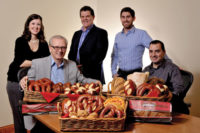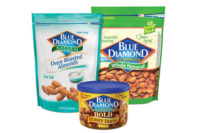Angelic Bakehouse’s new facility in Cudahy, Wis., bakes sprouted whole-grain breads, rolls and combo flatbread/pizza crusts using ingredients ‘as close to pure as possible,’ to offer clean-label, better-for-you products that it’s happy to feed family members and proud to offer customers.
Angelic Bakehouse, Cudahy, Wis., considers itself to be the only producer of sprouted grain breads, rolls, buns and more in the Midwest. It uses only natural
|
Want more Angelic Bakehouse information? |
| Want to see more images from the Angelic Bakehouse? Click here to see the full gallery! |
| SFWB visited the Angelic Bakehouse in Cudahy, WI. Check out the video by clicking here! |
| Want to read more about Angelic Bakehouse? Take a look at the SFWB plant feature by clicking here. |
ingredients and exacting recipe standards to provide a full line of fresh breads, buns, rolls and pizza dough that are naturally rich in protein, fiber and nutrients. It bakes 13 product varieties, seven of which are sliced bread (such as sprouted Seven-Grain; Reduced Sodium Seven-Grain; Honey Wheat with Raisins; Rye), three stock-keeping units of buns and rolls and three specialty items, which include a wheat baguette and a brand-new, grainy combination pizza crust and flatbread, appropriately called Flatzza. The bakery also produces fresh and frozen product under private label for several leading, upscale foodstore chains and can ship par-baked products and frozen dough.
Baked and shipped on the same day, the products are made with whole, sprouted grain in its purest form. “Everything we make is sprouted,” explains Jenny Marino, president and CEO. “Sprouted wheat is very healthy. It doesn’t lose key nutrients and vitamins through milling or refining, so it’s nutritious, but it also tastes good.”
The products are on trend. They’re made with nongenetically modified organisms (GMOs), are low in sugar and incorporate natural sunflower oil and locally sourced honey. “With food moving in a more health-conscious direction, Angelic refuses to settle for a bland taste,” Jenny adds. “And we never add any artificial sweeteners, fats or preservatives. We promise.”
She says she and husband James understand how hard it is to get kids to enjoy whole-grain alternatives. “We struggle with that daily,” she adds. “We wanted not only to produce nutritionally superior products, but they had to taste great, too. Americans have significantly increased their consumption of whole grains, so we developed premium, whole-grain products that play an important role in that healthy lifestyle, because we’re those consumers, too.”
The grains have to sprout in advance of baking and need to sit 24 hours prior to mixing, she says, “so we bake four days a week.” They use an unusual process in which they grind fresh, unprocessed, whole sprouted grain into a mash that’s used instead of conventional flour to create the bread dough. Only a handful of bakeries in the country make baked goods using such a process, say the Marinos.
Updates galore
Formerly known as Cybros The Sprouted Bakehouse, the bakery was acquired in November 2009 by the Marinos and renamed Angelic Bakehouse about a year ago. James Marino, COO and executive vice president, and his wife, Jenny, were new to the baking industry, but were entrepreneurial and business savvy, having been in the mortgage business for many years. They decided to get into a new business after the mortgage crisis. “It’s ironic, because this was one of the first businesses we looked at,” Jenny says. “James told me that a bakery was up for sale, and we dismissed it, because we knew nothing about baking, though we didn’t set out wanting to be in any particular type of industry.”
The couple looked at all kinds of business opportunities and coincidentally happened upon Cybros hamburger buns. “I bought some one night and didn’t know who Cybros was, but I made burgers with them, and we all loved them,” Jenny recalls. “James asked me where I found the burger buns, and it turns out they were from the bakery he was looking at,” she says. “He called a business broker the next day, and we then toured the bakery.”
Baking was indeed a new experience. “At first, we were over our heads,” James admits. “We might have oversimplified, but could see how improvable things were. We had to learn how to do business, and it’s a business that was totally out of our comfort level.”
What’s more, the original bakery was scrambling to accommodate numerous small-volume clients and loads of small transactions. “We learned the baking industry is a lot harder than just baking bread for customers…but certainly the Cybros foundation was strong when we purchased the business,” James remembers. “And many of the existing employees who had been there 20 to 25 years came with us.”
Growing pains
The couple studied and educated themselves as much as they could about making sprouted whole-grain bread and established process guidelines that were repeatable. “We were coming from another world and had a lot to figure out,” Jenny remembers. “We source most of our ingredients from a co-op. We had full access to their master baker, so we learned a lot from him and worked with him every chance we could. We relied on as much expert assistance as we could to produce and nail a good formula. And we discovered that our recipe changes seasonally because the grain sprouts differently at different times of the year.”
James agrees. “It’s a totally different science to make sprouted breads,” he says. “We brought in master bakers who even learned a lot when they came here. The fermentation occurs at different times [than it would with conventional flour dough] and the bread bakes at different temperatures than it would if it was made with regular flour. Taking over an existing bakery isn’t easy because we had to establishing ourselves locally and earn the trust of the local community and customers before we could launch new things. Building a brand takes time, and we’re more particular about who we sell to. It’s a unique product.”
Originally located in Waukesha, Wis., the bakery began making several product enhancements, creating new packaging and visuals and developing new products, which nurtured the customer base and started to expand volumes. Soon, growing pains set in and the bakery outgrew its cramped and outdated facility. Production improvements were desperately needed.
As James puts it, “There was a lot of manipulation that had to be made, just to get to a desired end state.” Not even a year after buying the business, the Marinos knew they had to relocate from the existing building in Wauskeha—affectionately referred to by James as “vintage.”
“We quickly realized we had to expand, and either tear down the old building or start over,” Jenny adds. “Much of the baking equipment there was bought in the 1920s, so it was very difficult to get it serviced or maintained. We couldn’t perform food-safety audits very easily in the space. And we were working in a very choppy customer base.”
Undertaking a robust $1.5-million expansion plan for the more than 40-year-old business, the Marinos built the new facility on four acres of land in Cudahy and moved there last December. The 22,000-sq.-ft. facility has about 3,500 sq. ft. of office space; an ample freezer room; a bright, windowed production area with three makeup lines; and an inviting test kitchen. “We’re still getting organized, unpacked and settled,” Jenny explains, smiling. “With its long history of quality and artisan products, the Milwaukee area is a great fit for the company. And it’s great fun to show off our products in the test kitchen.”
The facility was designed to accommodate the seasonal differences in the recipe formulation. “We spent some time getting the HVAC and climate control in this facility perfect,” she notes.
Food-safety facts
At the core of Angelic’s food-safety initiatives is the Hazard Analysis Critical Control Point (HACCP) program. Waiting until the move was complete to start certifying with the Global Food Safety Initiative (GFSI), the bakery installed GFSI-compliant systems, James points out. “We designed the new plant with GFSI requirements in mind, so chose the FSSC [Food Safety System Certification], which is one of the six approved GFSI schemes,” he explains. “At this point, we’re in the first phase of certification. Everything we did in terms of plant design factored in the GFSI requirements. It’s a comprehensive program, and we continuously swab equipment surfaces, monitor the air quality and validate the processes we’re executing every day.”
The Cudahy location has also created additional jobs and expanded production space by a whopping 400% and overall capacity by an amazing 800%, to accommodate the growing business and new market channels. Currently, there are 32 employees, but that total could sprout itself in the next three years, James says. Currently, there are five truck routes that take the products to distribution centers in the Chicago area; Green Bay and Madison, Wis.; and upscale supermarkets in the Milwaukee area.
Tongue-in-cheek taglines
The bakery’s name change was another update. “We came up with Angelic, as the nonreligious definition is an adjective to describe purity and goodness,” James explains. “And that’s how customers thought of it. It’s different than other brands in a sea of common adjectives in the bread aisle. The purity is what we’re conveying.”
To educate customers about the new name, the Marinos used social media, in-store promotions, newsletters and eblasts, and included coupons on the bags stating, “Get ready for a new bag.”
In addition, to reinforce the new Angelic Bakehouse name, the Marinos revamped the existing Cybros packaging and added eye-catching color coding; a crisp, mostly white-and-gold graphic design; and a wheat sprig logo, shaped to recall angel wings, plus the tagline, “Oh so pure,” to reflect both the name and the protein- and fiber-rich, sprouted grain ingredients. Another tagline used throughout the product line is, “Wickedly wholesome divinely delicious,” a reference to the Angelic name again and also a reflection of the goal to produce nutritious but appetizing sprouted product.
“Our competitive advantages are in the product and the messaging of the product,” James says. Amusing labels on the top of each bag show the new bakery’s flair and sense of fun. One bag of bread reads, “It’s delicious and nutritious, like being both smart & good-looking,” while another says, “Satisfy your inner health freak and sweet tooth at the same time.” Says Jenny, “We have the concept, so we might add a few more phrases, like, ‘Just do your best not to ignore the other food on the plate.’”
The attention-getting copy will be slightly “tweaked soon,” she adds. “But you see our culture is a lot of fun. We’re enthusiastic and not too serious. Our products have personality. The brand was too shy before.”
Described on its label as “Pizza or Flatbread, Blah, Blah, Blah,” the new Flatzza wheat pizza crust/flatbread product was launched nationally in February. Jenny says she hopes it will further boost brand awareness among consumers, retailers, distributors and foodservice providers. “We created it for somewhat selfish reasons,” she admits. “We wanted a new and interesting way to dish it up to our friends and family. What’s better than pizza?”
Flatzza sprouted seven-grain, thin-crust rounds are available in a 14-oz., two-pack, resealable zippered pouch. They can be baked, grilled or toasted. With a shelf life of 180 days frozen and 60 days ambient, the product has no dairy, nuts, GMOs, soy or high fructose corn syrup. The clever label reads, “Pizza or Flatbread, Blah, Blah, Blah,” which means it can be whatever consumers want it to be, Jenny says. “The packaging hasn’t been completed yet, so this is the prototype, but we wanted our packaging to be more memorable,” she adds.
While providing an alternative whole-sprouted grain option, the pizza crust allows the Marinos to enter new market spaces beyond the bread aisle, James points out.
“Products get more exciting as you go down the line to baguettes, flatbreads, crusts and all down the spectrum. We want to take our core competency, the sprouted, seven-grain mash we grind, and apply it to all kinds of different products. When we understood the taste and nutritional advantages of sprouted grain, we felt we could use it to go beyond sliced bread and rolls.”
With three new production lines and other added equipment, the increased capabilities at the larger location allow Angelic to make its sprouted products with even better quality and on a greater scale. “The production lines include new equipment or equipment that’s new to us,” James says. “We have more accuracy, thanks to the additional equipment and our new guidelines. The specialty part of our business will probably grow faster and ultimately overtake the retail end.”
Though they entered the baking business during a difficult economy, at a time when both whole-grain trends and food safety were evolving, in just five years, the couple managed to quadruple the size of the business. James is certain that Angelic’s future is as firmly planted as is the wheat after it spouts and takes strong root.
The germ of an idea
“Customers continue to tell us how elated they are to find great-tasting, healthy breads, and we are convinced that our sprouted breads have a place with mainstream consumers, as the general population looks for healthier food alternatives,” James says. “I think we’re right in a sweet spot, because we make a whole-grain product that actually tastes good. We define our process with a term called ‘sprouting for perfection.’ The germination of the grain actually provides nutritional benefits and to us it’s an art form, like coffee roasting and winemaking. There’s a specific technique to it. Ours is guided by taste and texture first. We learned to do it by lots of trial, error and training.”
Today, the Marinos continue to expand distribution nationally, selling the sprouted products through leading organic food retailers in the Midwest and Northeast regions, including several Whole Foods outlets, direct-store delivery to Milwaukee-area grocers, foodservice customers and distribution-center delivery of both its branded and private-label products. “We’re getting into more foodservice outlets and restaurant chains nationwide as they get into healthier sandwich builds,” says James.
Though they don’t feel like they’re on a roller coaster, often there aren’t enough hours in the day for the Marinos. “We have so much that we want to do, we have to prioritize,” Jenny observes. “But this is a fun business. We love it, and it’s so different from what we’re used to. At the end of the day, whether making widgets or bread, it’s still manufacturing and it’s complicated. But we’re having a wonderful time.”









